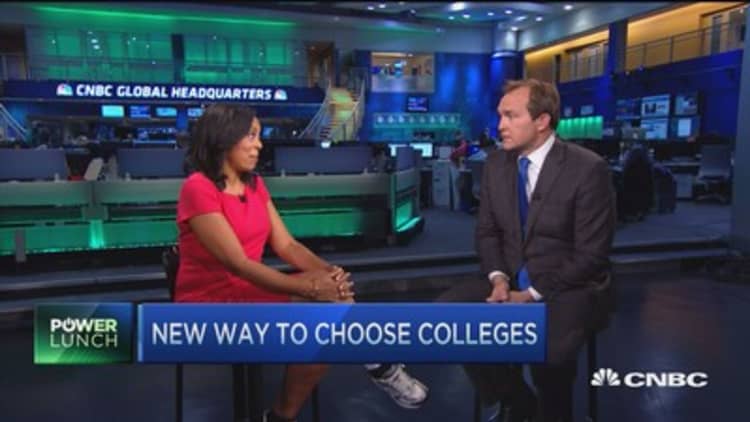If you just got a fat envelope, or its online equivalent, from your dream college, congratulations! All your hard work paid off.
But is that college really the best one for you? Your second-choice school may offer a better financial aid package in an effort to convince you to enroll, and it may have an alumni network every bit as powerful as your top pick.
When students and families weigh everything that goes into attending college, not least the cost, "the plan B schools sometimes are a better fit," said Katherine Pastor, a school counselor at Flagstaff High School in Arizona.
"Roughly a quarter million first-time, full-time students who entered four-year institutions in the fall of 2015 were accepted by their first-choice institution but opted to go elsewhere," said Kevin Eagan, managing director of the Higher Education Research Institute at UCLA, which publishes an annual survey of American freshmen. Put another way, close to 17 percent of first-time freshmen were accepted at their top school and chose to attend somewhere else.

Ana Bermudez learned that lesson when she applied to college as a lifelong Californian. She wanted to attend Berkeley, so when the time came she applied there and to a few backup schools.
She also applied to Notre Dame — but only as a favor to her uncle, a loyal alum. "I didn't want to disappoint him, but I also knew there was no way I would ever move to Indiana for four years," she said.
When Bermudez was accepted at Berkeley, she was thrilled. But then Notre Dame invited her for a visit, and she was immediately sold.
"I knew there was no turning back upon laying my eyes on that golden dome for the first time,"Bermudez said. It helped that Notre Dame also offered a financial aid package that Berkeley could not match.
Her Notre Dame degree has served her well: she landed a wealth management job with Merrill Lynch after graduation. More recently, she turned an idea for a company into a business plan through a Notre Dame competition, and received key financial and professional support for the start-up from the school's alumni network.
"Attending Notre Dame was the best choice I've ever made," Bermudez said. "I wouldn't have gone as far as I have now without my Notre Dame family."
Like Bermudez, many students cite money as a major reason they opted for their second-choice school.
Some 58 percent of those enrolling at their second-choice school said cost was an issue, compared with 41 percent of those attending their first choice, according to the Higher Education Research Institute.
That's not surprising, considering the price of college tuition, room and board at public universities rose 39 percent over the decade ended in 2012-2013, and 27 percent at private colleges and universities, according to the U.S. Department of Education. In the current school year, The College Board puts the average price tag for an in-state public institution at about $24,000. It's almost $48,000 for a private college.
Students opting for their first-choice school, in contrast, were more likely to cite graduates' record of landing good jobs or getting into top graduate or professional schools. They were also more likely to mention their school's strong academic record, the institute found.
"Across those measures, each time, those enrolling in their second choices are essentially conceding that this institution may be a different caliber," UCLA's Eagan said.
That may be, but many of those who opt for their second choice often do very well upon graduation.
Zachary Rael said he is extremely happy with the job he landed after graduating from New Mexico State University. Rael had been admitted to several schools outside his home state, including his favorite, Arizona State. But New Mexico offers a large stipend to high-achieving high school students who attend a state university, and Rael took that route.
"I did not want to put the financial burden on my parents or take out student loans," he said. And the choice turned out to be more than financially prudent. "I got the full college experience even though I was still in-state," he said.
Not only that, Rael landed a job even before he graduated in the field of his choice, broadcast journalism.
If I had it to do over, I would definitely go back to New Mexico State, he said. "I feel like I got everything I needed."
Similarly, Drew Johnson said he turned down numerous more selective schools to attend the University of Arkansas because the school covered tuition, room and board, and provided a new laptop and a stipend every semester. Johnson graduated, with "zero debt and cash in my bank account,'' he said.
Johnson is now working in strategy at Wal-Mart and is considering business school, he said.
"I have seen a few situations in which students made what I consider a questionable decision" and then hit some academic or athletic snags, said Nina Berler, a college counselor with a private practice who also provides counseling at The Hudson School in Hoboken, New Jersey. "But then a year goes by and those students have created opportunities or found internships that have helped them set a course for their futures. It's wonderful."
Berler said she has seen numerous examples of students who regretted choosing their most high-powered choices. "I see students select more elite colleges over others where they could be academic stars or receive more merit aid," she said.
Pastor, the Arizona school counselor, said she hears about students who set off for their first choice, only to find that it is not a good fit — like the student who went to a northern university on a track scholarship, only to find the environment to be too much for her.
Outcomes like that can be particularly difficult if a student has passed on scholarships and aid offers from a second-choice school, and now has to restart the process.
The upside may be this, however: "I have never heard of a kid who picked their second-choice school who has not been happy with their choice," Pastor said.







